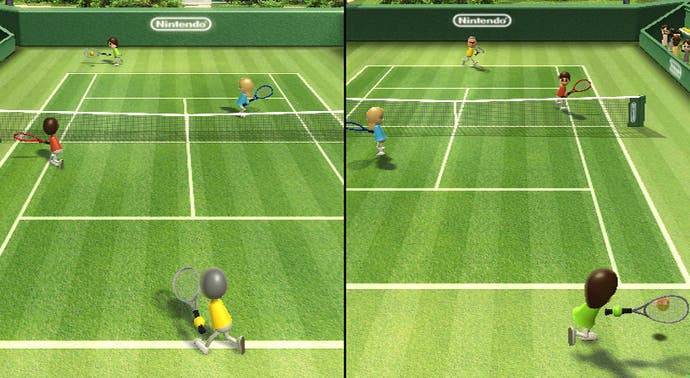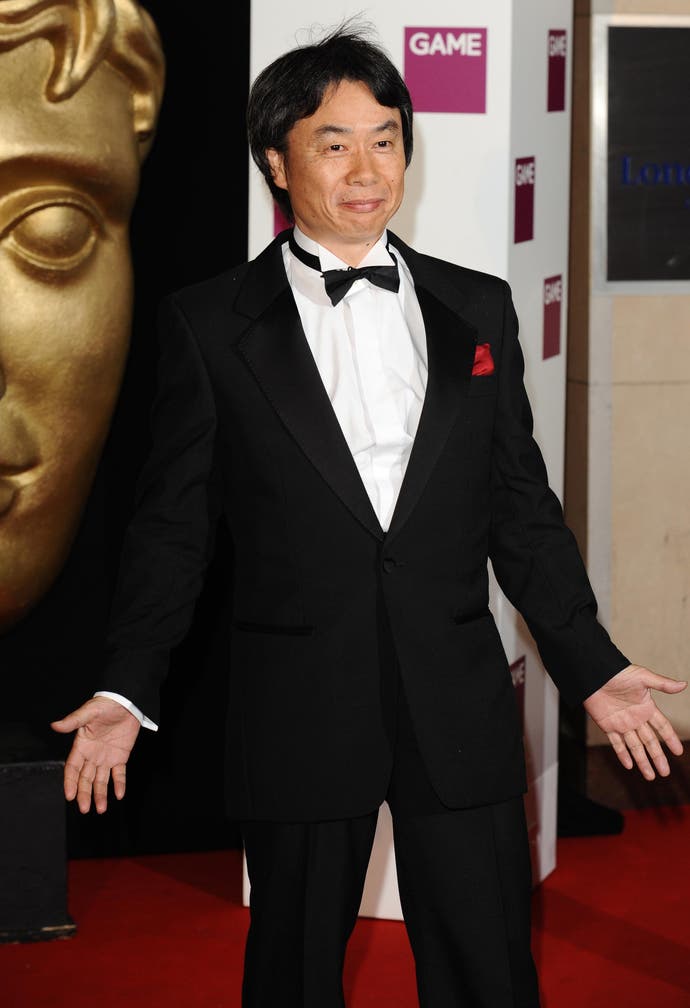Nintendo's Shigeru Miyamoto
In pursuit of happiness.
"For the past five or six years it has been one of Nintendo's challenges that we would like to persuade the public to understand that videogames are actually a very convenient and useful means to use in their daily lives. And I think our endeavours have borne some fruits so far," he notes with staggering understatement.
"We're hopeful we can expand that kind of endeavour so that in the future we'll be able to see a situation where the general public are going to take for granted using videogames technology one way or another."
DS, as Miyamoto has noted before, even got his wife into games for the first time. It turns out she's still hooked. "She's continuing her practice of playing a lot more games lately," he beams. "Her most recent favourite is the Professor Layton series. Quite recently when she lost the DS card she was really, really upset. That's a good sign!"
It's unclear whether Mrs Mario's gaming flirtations extend to Wii but, as Move and Natal demonstrate, Sony and Microsoft are certainly jealous admirers.
"We feel it's an honour that some form of entertainment style we created is now going to be taken for granted thanks to the attitude taken by the other companies," Miyamoto says. "On the other hand, Nintendo is a company that is always striving to create something unique and unprecedented. And if we can do that, if we can establish to the world that videogames have such huge potential for daily life, the existence of games will be even more highly appreciated by the public."

This, the father of gaming feels, is his "responsibility". "The fact is many people are afraid or scared of gaming technology," he says. "Actually it's very convenient, useful technology and as long as you can have some time to get accustomed there's nothing to be afraid of at all.
"So my responsibility here must be to try to let people understand how convenient and useful game technology is and try to remove hurdles so that even your grandpa and grandma are waiting to turn on the power switch of your console easily without hesitation."
The following evening, the BAFTA ceremony offers up the uniquely surreal sight of a tuxedo-clad Miyamoto, in black tie with Mario-red hanky sprouting from his breast pocket, eating dinner with Ant and Dec.
When the Mario and Luigi of light entertainment present him with his Academy Fellowship, preceded by awestruck video tributes from previous recipients Will Wright and Nolan Bushnell, the standing ovation that greets Miyamoto's walk onto stage visibly moves the designer, as he almost chokes while delivering a speech in English filled with humility and gratitude. Misty eyes all round, it's a lump-in-throat moment for anyone who's loved his works. Which must be a clear majority of the room.

I've been listening to his speech directly behind the stage, waiting with a film crew to get his first reaction on receiving the Fellowship. A little overwhelmed by the rapturous cheers, he asks for a glass of water and gathers himself.
"I was rather nervous but I'm really, really glad and honoured everyone was listening to me with that kind of special attachment," he says. "More important than that I was really grateful for being able tonight to observe the great games by younger people.
"Very frankly speaking, I have to admit videogames still have some way to go in order to reach the level of movies when it comes to social acceptance by the general public. That reminds me I'm really grateful to receive this kind of award, and at the same time reminds me we still have to carry on making a great effort."
I ask him what advice he would give to aspiring game makers. "If I can give any advice: be yourself. Try to be different from the others, regardless of whatever's hot or selling well in the marketplace. Try to find something really unique to you. Even though you'll be one of many developers working on a project, one individual's idea is going to stand out somehow and that's something that will appeal to game fans."
As we wrap up our final interview and he walks off with other Nintendo staff to savour the moment, it occurs to me the emotional Miyamoto I've just seen wasn't simply struck by the occasion. It was something he'd said to me earlier, about his philosophy of games design.
"The way I make games is I really want people to feel sympathy with me. I really want to create emotional attachment that I myself have towards the games I'm making. As long as emotional feelings are involved I really don't need any particular language - there is no language barrier at all. In other words, I really want people to have the same emotional experience of happiness."
Tonight, on stage surrounded by his peers, he saw exactly how much they felt it.
